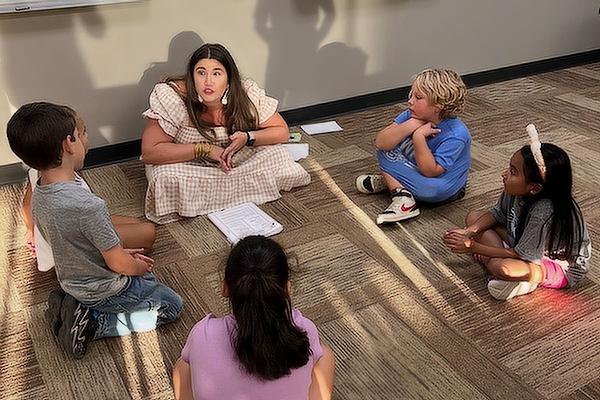
“Catholic guilt” is a common phrase among older Catholics, but diocesan youth ministry director Liz Tingquist said it’s fading from the vocabulary of younger generations.
“They don’t bring it up at all. I think it’s totally different for the young Catholics we have now. I think that Catholic guilt calls to mind an era in the Church that precedes our young people now,” she said. “I just think since Vatican II, the Church is more loving and more approachable in terms of our Catholic faith. It is more loving and more approachable in changes that were made; confession is called reconciliation. You’re reconciling with the Church. I think the language is more welcoming and loving and less stringent.”
Laritza Chena, 18, who grew up attending St. James Church in Searcy, is a freshman at Columbia University in New York City. In a Sept. 25 Youth Faith column in Arkansas Catholic, she wrote about feeling guilt when scrolling through social media took her away from prayer time.
“It’s definitely what keeps me in check,” Chena said of guilt. “If there are ever times I don’t really want to go to Mass, I remember the times I haven’t gone to Mass and the guilt I felt. And there are times there’s nothing I can do. There are times I can’t go to Mass, and it’s not my fault, but it keeps me in check.”
Growing up, she was familiar with the phrase “Catholic guilt,” but other people usually used it toward her, saying things like, “You can’t do this because you’re Catholic.” But for her and likely other young adults, religious education and youth ministry were different than pre-Vatican II.
“My experience was definitely more positive. Obviously, they explained to us the rules of Catholicism, things we should and shouldn’t do,” but she said it was never used in a threatening way and focused on forgiveness. “Teaching about forgiveness and asking for forgiveness is what I think is more positive.”
Even though there’s less “hell talk” these days with young children, it doesn’t mean there haven’t been some missteps with faith formation.
Growing up, Kaitlyn Hartman, 20, director of youth faith formation at St. Joseph Church in Conway, remembers the big push in Sunday school classes to memorize the traditional Catholic prayers and be tested on them.
“They were like, ‘Well, if you don’t learn all these things and have it together,’ there was this guilt wrapped around knowing the Lord on a very educational level,” she said. “I know for me coming into this role, I am pushing for the kids to know the Lord on a relationship level.”
Children are still learning traditional prayers, but Hartman explains it’s usually recited at the beginning and end of class, and signs with the words are displayed so children can learn naturally.
Hartman said they discuss sin and evil broadly. They talk about how humans sin, but no one is exempt from sin.
“When we talk about sin to young ones we also follow it up by talking about how merciful God is and how we have the blessing to receive reconciliation. We never talk about sin without the mercy of God,” she said. “I think there’s always a level of curiosity even when we talk about the sacrament of penance: ‘Will the priest know who I am?’ or ‘Will the priest remember what I said?’ or ‘Will they be judgemental toward me?’ And just the forgiveness of God, ‘Will God really forgive me?’ As catechists, as educators, we say, ‘Of course; there is no sin too great for God, and his mercy covers it all.’ As adults, that is what we’re here for our kids to answer those questions and to remind them how good our God is.”
Even with a more relational style of teaching faith formation, the impact of Catholic guilt can still plague even younger Catholics.
“It’s a real thing. There’s even some people in today’s day and age, even young people who experience it. But I think we’re getting better at it. Our Church is not all hell and damnation; there’s mercy and forgiveness as well,” Hartman said.
Please read our Comments Policy before posting.
Article comments powered by Disqus St. Timothy winner recommends adoration to other teens
St. Timothy winner recommends adoration to other teens
 Teens learn value of saints, Eucharist at convention
Teens learn value of saints, Eucharist at convention
 Catholic communities preparing for total solar eclipse
Catholic communities preparing for total solar eclipse
 Missionary Catechist ministered to Hispanic community
Missionary Catechist ministered to Hispanic community
 New campus ministers help students grow in their faith
New campus ministers help students grow in their faith
 Studio 3:16 offers new approach to teaching religion
Studio 3:16 offers new approach to teaching religion
 After three decades, NLR principal plans to retire
After three decades, NLR principal plans to retire
 CHS athlete overcomes odds to reach collegiate goal
CHS athlete overcomes odds to reach collegiate goal
 John Calipari: UA basketball coach and devout Catholic
John Calipari: UA basketball coach and devout Catholic
 'Cabrini' film tells story of saint with great faith
'Cabrini' film tells story of saint with great faith
 St. Joseph a model of solidarity with immigrants
St. Joseph a model of solidarity with immigrants
 Two gifts after Jesus’ death: Virgin Mary and Eucharist
Two gifts after Jesus’ death: Virgin Mary and Eucharist
 Why we have an altar, and not just a communion table
Why we have an altar, and not just a communion table
 Pope: Wars should be resolved through nonviolence
Pope: Wars should be resolved through nonviolence
 Living relationship with Jesus Christ in the Eucharist
Living relationship with Jesus Christ in the Eucharist